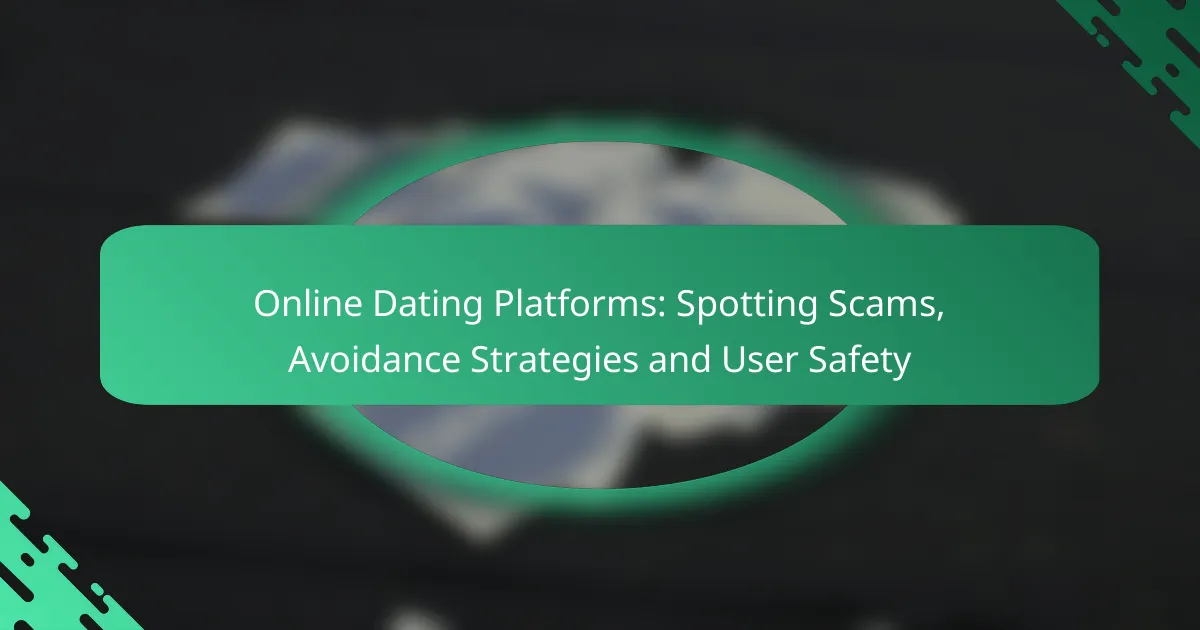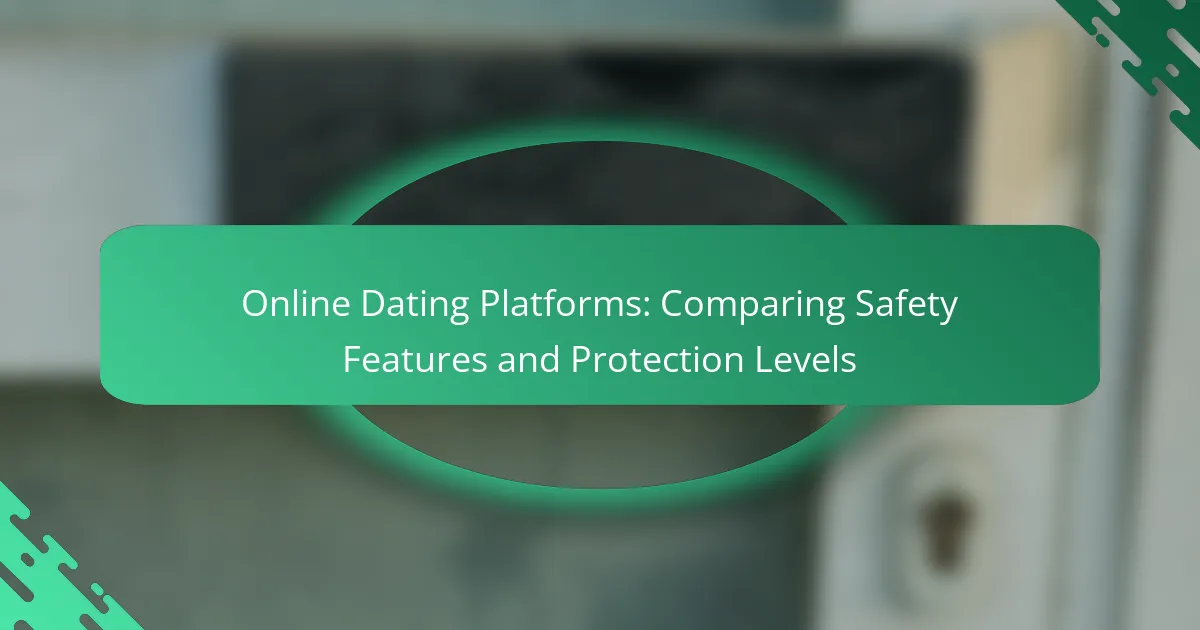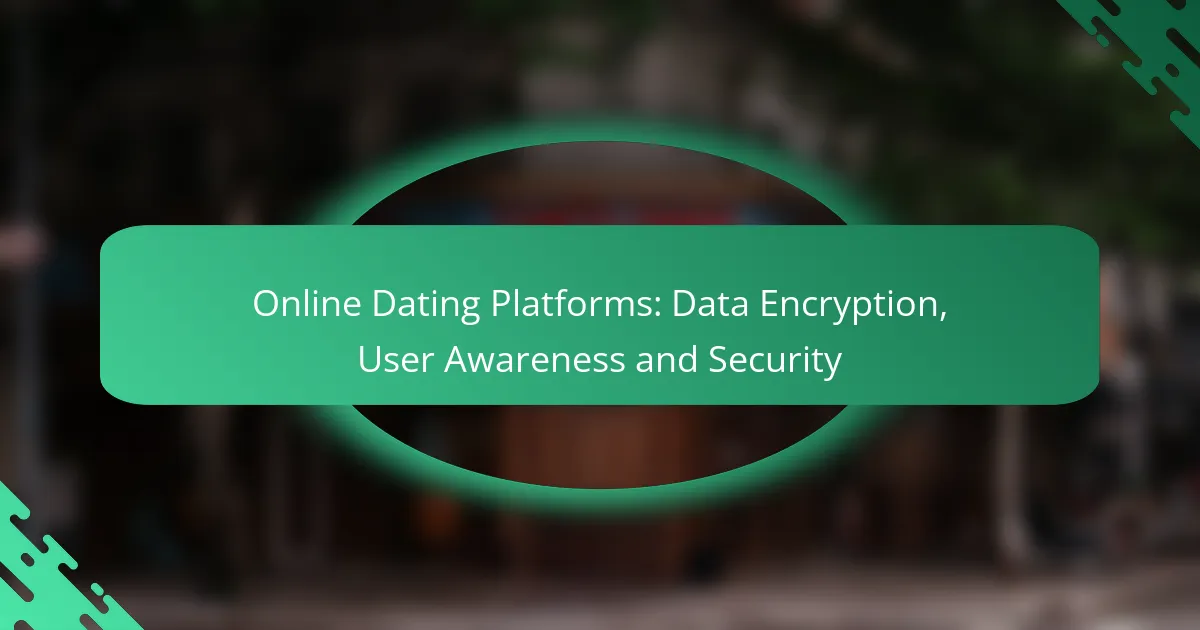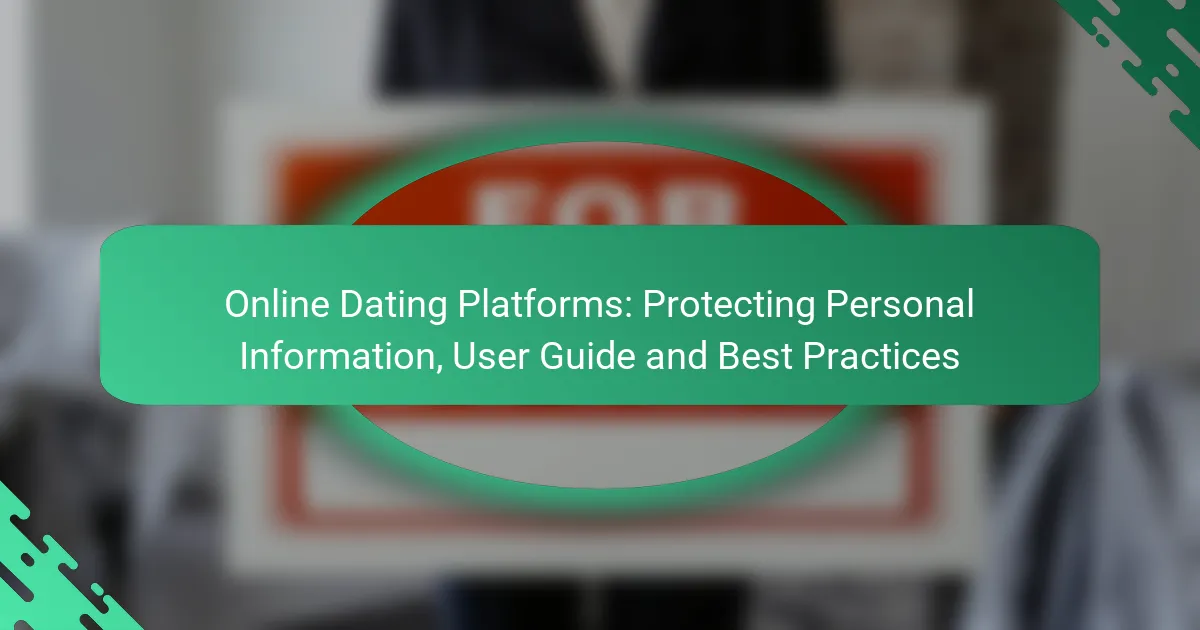Online dating can be an exciting way to meet new people, but it also comes with risks, particularly from scams. Recognizing suspicious behavior and employing effective avoidance strategies are crucial for ensuring a safe experience. By staying vigilant and following best practices, users can protect themselves and enjoy the benefits of online dating with greater confidence.

How to identify scams on online dating platforms?
Identifying scams on online dating platforms involves recognizing suspicious behavior and communication patterns. Users should be vigilant about unusual requests, inconsistencies in profiles, and overly emotional or urgent messages.
Red flags of online dating scams
Common red flags include profiles that lack personal details or have generic information. If a user quickly asks for personal information or moves the conversation off the platform to private messaging or phone calls, it may indicate a scam.
Another warning sign is if the person claims to be in a foreign country and needs financial assistance. Scammers often create elaborate stories to elicit sympathy and financial help.
Common scam tactics
Scammers frequently use tactics such as creating fake personas, often accompanied by attractive photos stolen from the internet. They may engage in love bombing, showering the victim with affection and attention to build trust quickly.
Another tactic is the use of urgency, where the scammer pressures the victim to act quickly, often related to a fabricated emergency. This can lead to impulsive decisions that result in financial loss.
Signs of a fake profile
Fake profiles often have inconsistencies, such as mismatched photos and information. If the profile picture appears overly polished or professional, it may be a sign of a scam.
Additionally, profiles that have few friends or connections, or that have been created recently, can indicate a lack of authenticity. Users should be cautious if the individual avoids video calls or refuses to meet in person.
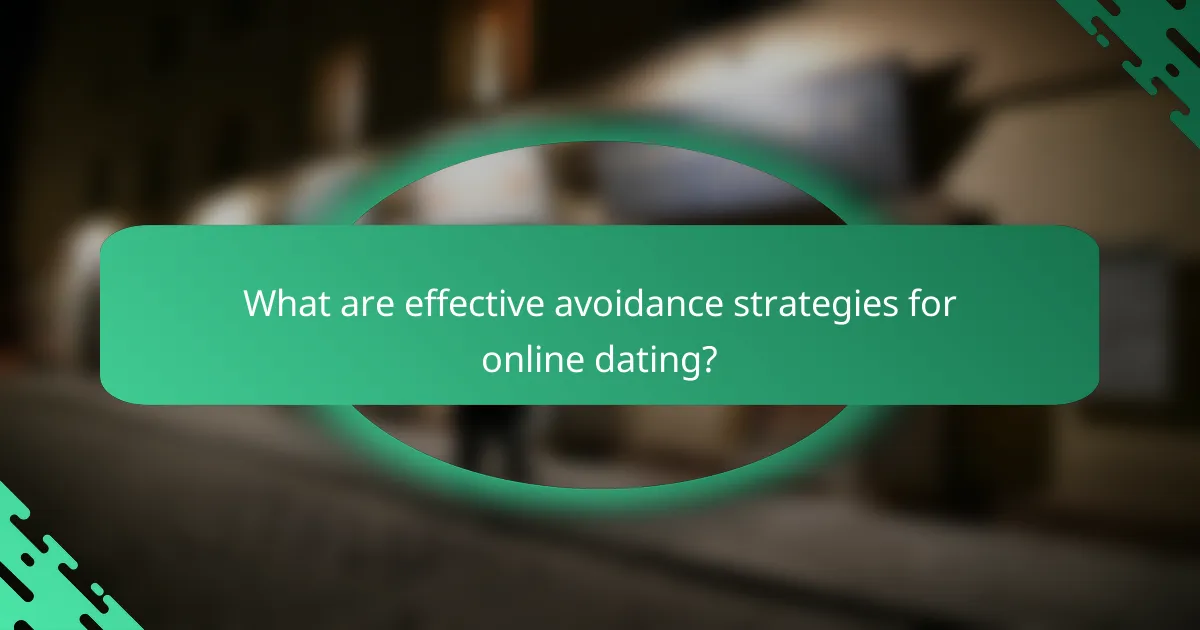
What are effective avoidance strategies for online dating?
Effective avoidance strategies for online dating include using reputable platforms, ensuring secure communication, and verifying user identities. These practices help users minimize the risk of scams and enhance their overall safety while engaging in online dating.
Using reputable dating platforms
Selecting a reputable dating platform is crucial for a safe online dating experience. Look for sites that have strong security measures, user reviews, and clear policies on user safety. Popular platforms like Match.com, eHarmony, and Tinder often have built-in safety features and customer support.
Check for certifications or endorsements from consumer protection agencies, which can indicate a commitment to user safety. Avoid lesser-known sites that lack transparency or have a high number of reported scams.
Setting up secure communication
Establishing secure communication is essential to protect personal information. Use the messaging features provided by the dating platform instead of sharing your phone number or email address too early. This adds a layer of privacy while you get to know the other person.
Consider using video calls before meeting in person. This not only helps verify the other person’s identity but also allows you to gauge their behavior and intentions in real-time.
Verifying user identities
Verifying user identities can significantly reduce the likelihood of encountering scams. Look for platforms that offer identity verification processes, where users can confirm their profiles through official documents or social media accounts.
Additionally, conduct your own checks by searching for the person’s name or photos online. If something seems off or if they refuse to share additional information, trust your instincts and proceed with caution.
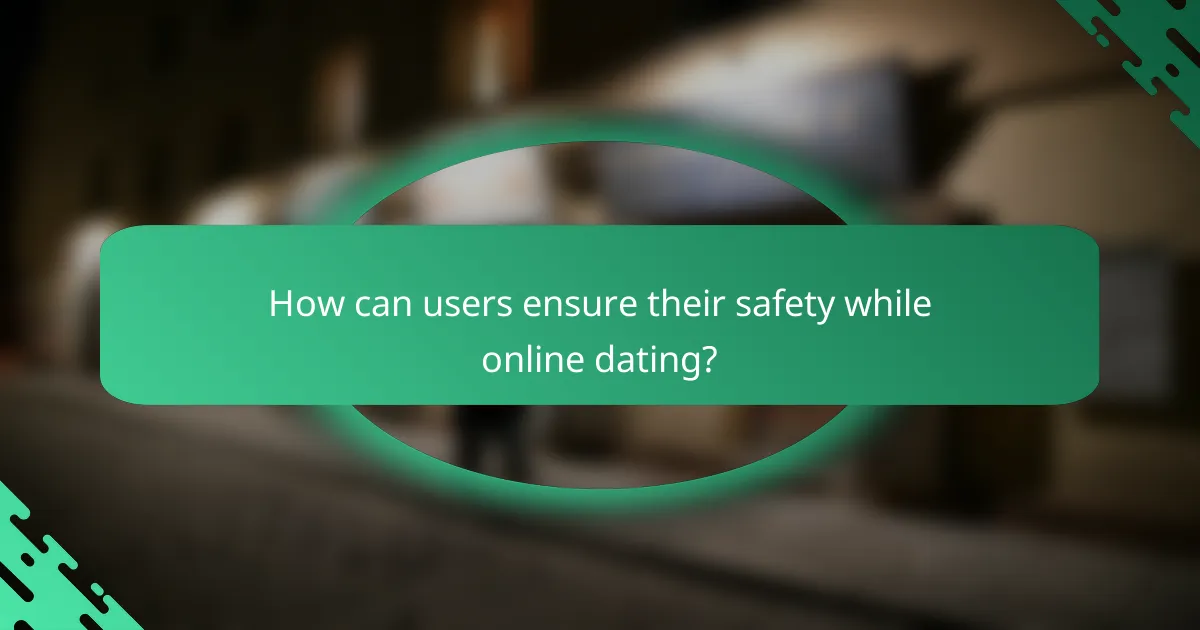
How can users ensure their safety while online dating?
Users can ensure their safety while online dating by being vigilant about their personal information, following safe meeting practices, and reporting any suspicious activity. By taking proactive steps, individuals can minimize risks and enjoy a more secure dating experience.
Best practices for personal information protection
To protect personal information, avoid sharing sensitive details such as your home address, financial information, or workplace until you fully trust the other person. Use a dedicated email address for dating profiles to keep your primary email private.
Additionally, consider using a nickname or first name instead of your full name. This adds a layer of anonymity while still allowing for connection. Regularly review your privacy settings on dating platforms to control who can see your information.
Safe meeting guidelines
When meeting someone for the first time, choose a public place such as a café or park. Inform a friend or family member about your plans, including the location and time of the meeting. This ensures someone is aware of your whereabouts.
Trust your instincts; if something feels off during the meeting, it’s okay to leave. Avoid sharing personal transportation details, such as your home address, until you are comfortable with the person.
Reporting suspicious activity
If you encounter suspicious behavior, such as requests for money or personal information, report it immediately to the dating platform. Most reputable sites have mechanisms in place for reporting users who violate their terms of service.
Document any interactions that seem fraudulent, including screenshots of conversations. This information can be helpful for both the platform and law enforcement if necessary. Remember, acting quickly can help protect not only yourself but also other users.

What are the most popular online dating platforms in the US?
The most popular online dating platforms in the US include Tinder, Match.com, and Bumble. Each platform offers unique features and caters to different user preferences, making it essential to understand their characteristics before joining.
Tinder overview
Tinder is known for its swipe-based interface, allowing users to quickly browse profiles and connect with potential matches. Users can create a profile with photos and a short bio, then swipe right to like or left to pass on profiles.
With a large user base, Tinder is particularly popular among younger individuals looking for casual relationships. The app also offers a premium subscription that unlocks additional features, such as unlimited swipes and the ability to see who liked your profile.
Match.com features
Match.com focuses on fostering serious relationships by providing detailed profiles and compatibility matching. Users can fill out extensive questionnaires to help the platform suggest compatible matches based on shared interests and values.
This platform typically attracts a more mature audience, often seeking long-term commitments. Match.com also offers features like messaging, profile viewing, and the ability to see who has viewed your profile, enhancing user interaction.
Bumble safety measures
Bumble prioritizes user safety by implementing several features designed to protect its members. One key aspect is that women must initiate conversations after a match is made, which helps reduce unwanted messages and harassment.
Additionally, Bumble includes options for reporting and blocking users, as well as a photo verification process to ensure authenticity. These measures contribute to a safer dating environment, making it a preferred choice for many users concerned about safety.
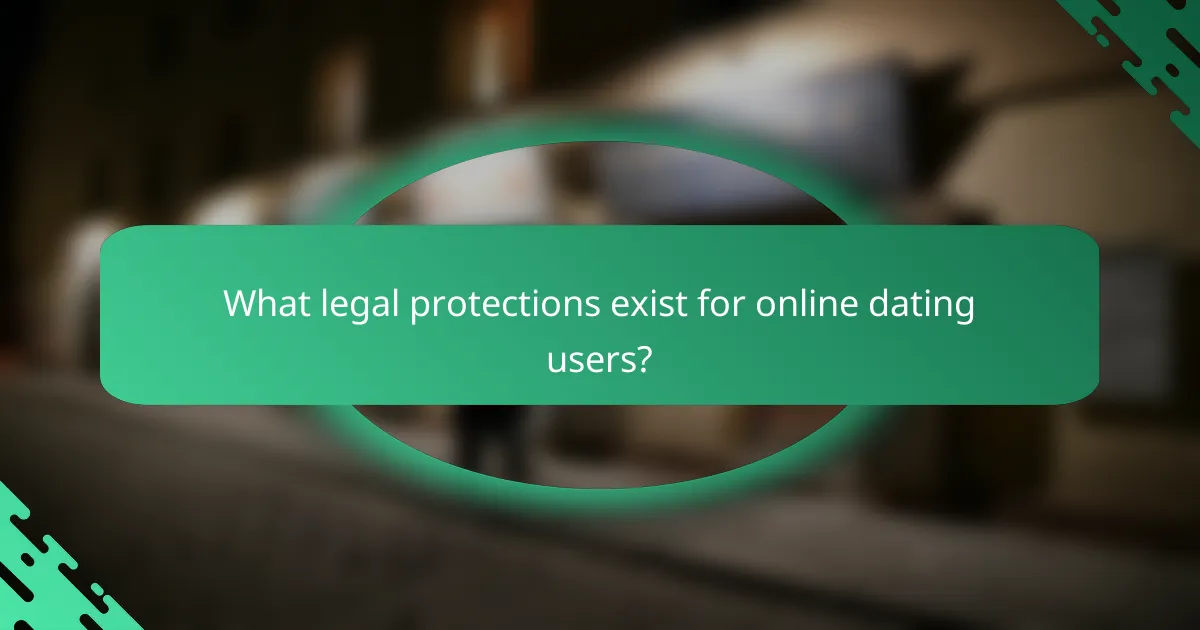
What legal protections exist for online dating users?
Online dating users are protected by various legal frameworks designed to ensure their safety and security. These protections can include consumer rights, privacy regulations, and specific laws addressing online fraud.
Consumer protection laws
Consumer protection laws vary by country but generally aim to safeguard individuals from deceptive practices in online transactions, including dating services. In the United States, for instance, the Federal Trade Commission (FTC) enforces regulations against false advertising and scams, which can apply to dating platforms.
Users should be aware of their rights when using these services, such as the right to receive truthful information and the right to seek redress for fraudulent activities. Familiarizing oneself with local consumer protection agencies can provide additional resources and support.
Reporting scams to authorities
If a user encounters a scam on a dating platform, it is crucial to report it to the appropriate authorities. In the U.S., this can include the FTC, the Internet Crime Complaint Center (IC3), and local law enforcement. Reporting helps to track and combat fraudulent activities.
Users in other countries should look for similar organizations that handle online fraud and scams. Providing detailed information about the scam can assist authorities in their investigations and potentially prevent others from falling victim.
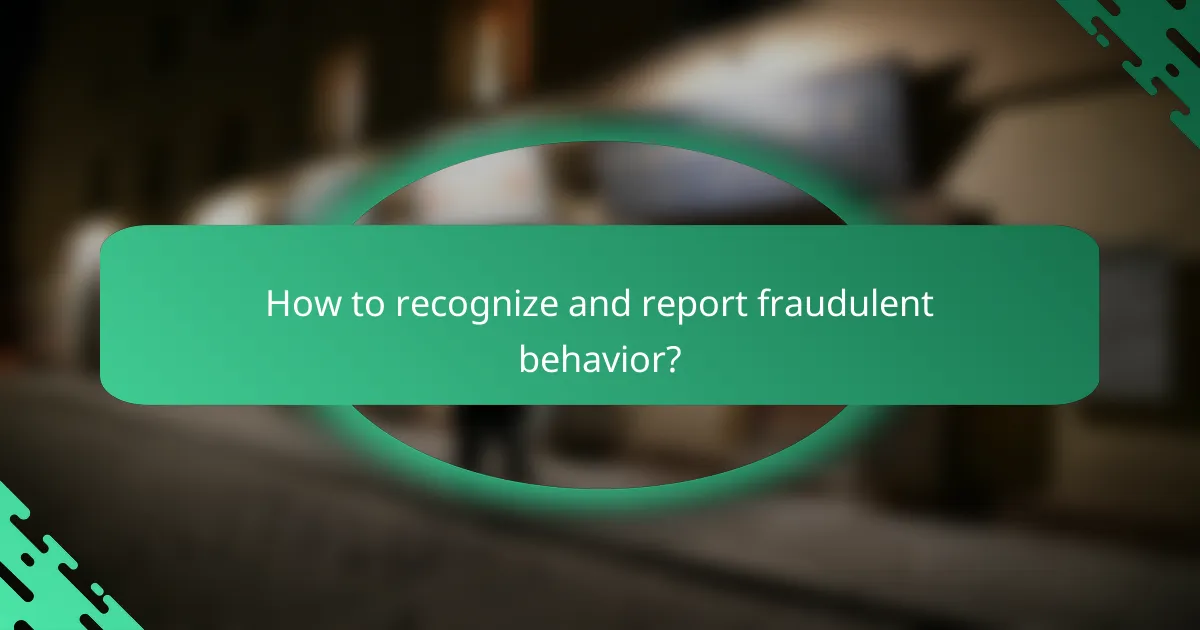
How to recognize and report fraudulent behavior?
Recognizing and reporting fraudulent behavior on online dating platforms involves identifying red flags and taking prompt action. Users should be vigilant about suspicious activities and know how to report them effectively to protect themselves and others.
Common signs of online dating scams
Common signs of online dating scams include profiles with generic photos, vague personal information, and requests for money or personal details. Scammers often create a sense of urgency, claiming emergencies that require financial assistance. If someone you just met online asks for money or sensitive information, it’s a significant warning sign.
Another indicator is inconsistent communication. If the person frequently changes their story or avoids answering direct questions, trust your instincts. Legitimate users will engage openly and provide clear information about themselves.
Steps to report fraudulent behavior
To report fraudulent behavior, start by documenting all interactions with the suspected scammer. Take screenshots of conversations, profile details, and any requests for money. Most dating platforms have a dedicated reporting feature, which you can find in the user settings or help section.
After reporting through the platform, consider notifying local authorities if you believe you’ve been a victim of fraud. In the U.S., you can report to the Federal Trade Commission (FTC) or your local consumer protection agency. In Europe, similar actions can be taken through national consumer protection organizations.
Protecting yourself from scams
To protect yourself from scams, always be cautious about sharing personal information. Avoid giving out your phone number, home address, or financial details until you are certain of the person’s identity. Use the platform’s messaging system for initial conversations, as it offers a layer of security.
Additionally, consider video chatting before meeting in person. This can help verify the person’s identity and build trust. Always meet in public places for the first few dates and inform a friend or family member about your plans.
